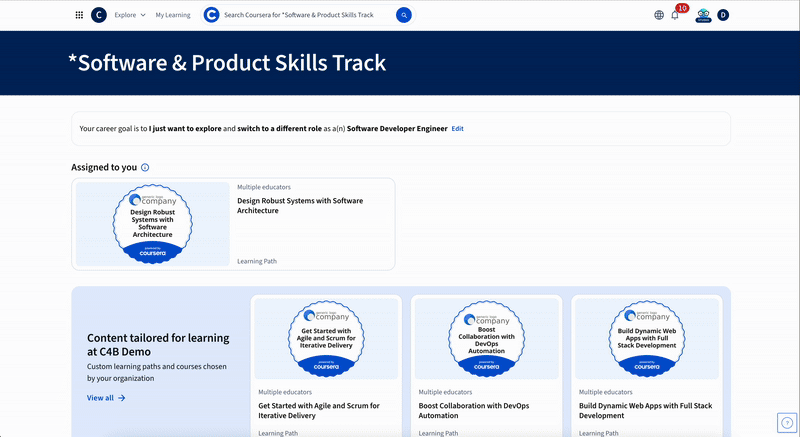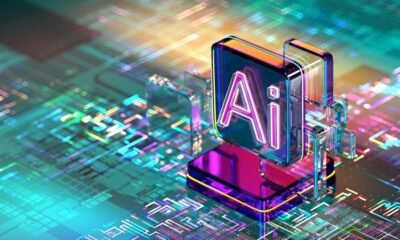Books, Courses & Certifications
3 Free AI Certifications For Beginners To Get Hired In 2025

Start with building general AI fluency, then progress from there and learn applied AI
AI certifications are the new degrees. Cheaper, quicker to complete, more value to employers, and increases your chances of hiring by 94% compared to the undergraduate route.
Having AI courses under your belt signals to employers that you’re a more likely fit for their AI-focused culture, especially as large companies like Amazon and Salesforce move towards mass AI implementation and restructuring their workplaces.
In 2025, it’s no longer a question of, Should I study AI? Is it needed?
It’s now a matter of, Which AI certifications should I study to get hired?
Regardless of your career goals, you need AI, but you need to be able to choose the right certifications so you can learn the right skills specific to your goals, role, and industry.
In this article, you’ll discover:
- How to get hired through AI certifications
- Which AI courses you should study first
- If AI courses are really worth all the hype
Which AI Certification Should You Start First?
If you’re a complete newbie to the AI world and are seeking to build your AI skills from scratch, here are the best courses you can start with today. (These are free at the time of writing, and get your toes dipped in the water.)
- Introduction to Generative AI by Google Cloud
- Generative AI for Beginners by Microsoft (a free 18-lesson video course)
- AWS Simulearn—Generative AI (free as part of the AWS Skill-Builder subscription if you have one already)
You can discover more free AI courses in this Forbes article, and learn about free Generative AI courses here.
Once you’ve studied and understood the essentials, it’s important to not leave it there. Move from having generic knowledge to building applied AI skills.
According to IBM executive and vice president Justina Nixon-Saintil, applied AI is one of the most important AI skills to build because that’s when you begin to see real, tangible benefits in your work, business, and/or career.
“Start with general AI fluency,” Nixon-Saintil advises, “then figure out how to make it work in your role.”
This is where role and industry-specific AI courses like the ones below can be helpful:
- ChatGPT Foundations for K-12 Educators, by Common Sense Media and OpenAI
- Generative AI Content Creation, by Adobe, via Coursera (can be accessed for free using the financial aid option)
- PMI’s Artificial Intelligence in Project Management course
- GenAI for UX Designers, via Coursera
- Generative AI for HR Professionals, via Coursera
Are AI Certifications Worth It?
Sure, hands-on AI experience is valuable, but putting a stamp on it through a certification that evidences you’ve completed a course demonstrates that you’re in the league of top-tier talent, and that you’ve taken the time to invest in yourself, even if you don’t have a degree.
Employers like to see evidence of credentials on your resume.
Why?
Because it demonstrates:
- Passion for continuous growth and learning, a growth mindset which matches their work culture.
- That you’re relevant and in tune with the needs of the industry and therefore with the market they operate in.
- That you’re just as serious about AI implementation as they are, and are the perfect person to partner with in their journey to optimizing their processes and workflows with AI.
According to a 2024 AWS survey of 3,297 employees and 1,340 organizations in the U.S., employers’ findings revealed that:
- 92% of organizations intend to use AI-powered solutions by 2028.
- Employers believe that workers in specific departments, like sales and marketing (85%) and human resources (78%), will derive significant value from AI implementation.
Employers are even willing to pay a premium for AI-skilled talent. Here’s what it breaks down to across business functions and departments:
- AI-skilled IT professionals–up to 47% higher salary
- AI-skilled sales and marketing professionals–43% higher salary
- AI-skilled finance professionals 42% higher salary
- AI-skilled business operations professionals–41% higher salary
- AI-skilled legal, regulatory, and compliance professionals –37% higher salary
- AI-skilled HR professionals–35% higher salary
What Should You Look For In An AI Certification?
When shopping around for AI courses, bear in mind that anyone can offer an AI course, so this is fairly unregulated territory.
To ensure you’re getting maximum value as relates to your job search and rapid career growth, ask yourself these questions.:
- Does the AI course include hands-on projects so I can build a portfolio?
- Is the course provider recognised by employers?
- If not, is it taught by a proven expert in AI technology?
- Even better, does this expert have a background in the field I want to pursue?
- Does the course teach applied AI principles specific to my desired role in industry?
- Does this course come with a certificate?
- Is the financial investment worth it? There are many AI courses that are free, however, if you are to pay for a course, you need to be even more vigilant that it meets the above criteria first.
What’s stopping you from beginning your AI upskilling journey right now? Be real with yourself.
Nine in 10 employers plan to use AI fully by 2028, so if you don’t upskill, you’ll be fired
Are you content to be the employee that’s first on the layoff list, always at risk of being replaced, and always last to be chosen for an interview? Or are you going to be the type of professional that is intentional and strategic about their professional growth and learning, and uses AI as a tool to accelerate their career success?
It’s up to you to decide.
Books, Courses & Certifications
Powering innovation at scale: How AWS is tackling AI infrastructure challenges

As generative AI continues to transform how enterprises operate—and develop net new innovations—the infrastructure demands for training and deploying AI models have grown exponentially. Traditional infrastructure approaches are struggling to keep pace with today’s computational requirements, network demands, and resilience needs of modern AI workloads.
At AWS, we’re also seeing a transformation across the technology landscape as organizations move from experimental AI projects to production deployments at scale. This shift demands infrastructure that can deliver unprecedented performance while maintaining security, reliability, and cost-effectiveness. That’s why we’ve made significant investments in networking innovations, specialized compute resources, and resilient infrastructure that’s designed specifically for AI workloads.
Accelerating model experimentation and training with SageMaker AI
The gateway to our AI infrastructure strategy is Amazon SageMaker AI, which provides purpose-built tools and workflows to streamline experimentation and accelerate the end-to-end model development lifecycle. One of our key innovations in this area is Amazon SageMaker HyperPod, which removes the undifferentiated heavy lifting involved in building and optimizing AI infrastructure.
At its core, SageMaker HyperPod represents a paradigm shift by moving beyond the traditional emphasis on raw computational power toward intelligent and adaptive resource management. It comes with advanced resiliency capabilities so that clusters can automatically recover from model training failures across the full stack, while automatically splitting training workloads across thousands of accelerators for parallel processing.
The impact of infrastructure reliability on training efficiency is significant. On a 16,000-chip cluster, for instance, every 0.1% decrease in daily node failure rate improves cluster productivity by 4.2% —translating to potential savings of up to $200,000 per day for a 16,000 H100 GPU cluster. To address this challenge, we recently introduced Managed Tiered Checkpointing in HyperPod, leveraging CPU memory for high-performance checkpoint storage with automatic data replication. This innovation helps deliver faster recovery times and is a cost-effective solution compared to traditional disk-based approaches.
For those working with today’s most popular models, HyperPod also offers over 30 curated model training recipes, including support for OpenAI GPT-OSS, DeepSeek R1, Llama, Mistral, and Mixtral. These recipes automate key steps like loading training datasets, applying distributed training techniques, and configuring systems for checkpointing and recovery from infrastructure failures. And with support for popular tools like Jupyter, vLLM, LangChain, and MLflow, you can manage containerized apps and scale clusters dynamically as you scale your foundation model training and inference workloads.
Overcoming the bottleneck: Network performance
As organizations scale their AI initiatives from proof of concept to production, network performance often becomes the critical bottleneck that can make or break success. This is particularly true when training large language models, where even minor network delays can add days or weeks to training time and significantly increase costs. In 2024, the scale of our networking investments was unprecedented; we installed over 3 million network links to support our latest AI network fabric, or 10p10u infrastructure. Supporting more than 20,000 GPUs while delivering 10s of petabits of bandwidth with under 10 microseconds of latency between servers, this infrastructure enables organizations to train massive models that were previously impractical or impossibly expensive. To put this in perspective: what used to take weeks can now be accomplished in days, allowing companies to iterate faster and bring AI innovations to customers sooner.
At the heart of this network architecture is our revolutionary Scalable Intent Driven Routing (SIDR) protocol and Elastic Fabric Adapter (EFA). SIDR acts as an intelligent traffic control system that can instantly reroute data when it detects network congestion or failures, responding in under one second—ten times faster than traditional distributed networking approaches.
Accelerated computing for AI
The computational demands of modern AI workloads are pushing traditional infrastructure to its limits. Whether you’re fine-tuning a foundation model for your specific use case or training a model from scratch, having the right compute infrastructure isn’t just about raw power—it’s about having the flexibility to choose the most cost-effective and efficient solution for your specific needs.
AWS offers the industry’s broadest selection of accelerated computing options, anchored by both our long-standing partnership with NVIDIA and our custom-built AWS Trainium chips. This year’s launch of P6 instances featuring NVIDIA Blackwell chips demonstrates our continued commitment to bringing the latest GPU technology to our customers. The P6-B200 instances provide 8 NVIDIA Blackwell GPUs with 1.4 TB of high bandwidth GPU memory and up to 3.2 Tbps of EFAv4 networking. In preliminary testing, customers like JetBrains have already seen greater than 85% faster training times on P6-B200 over H200-based P5en instances across their ML pipelines.
To make AI more affordable and accessible, we also developed AWS Trainium, our custom AI chip designed specifically for ML workloads. Using a unique systolic array architecture, Trainium creates efficient computing pipelines that reduce memory bandwidth demands. To simplify access to this infrastructure, EC2 Capacity Blocks for ML also enable you to reserve accelerated compute instances within EC2 UltraClusters for up to six months, giving customers predictable access to the accelerated compute they need.
Preparing for tomorrow’s innovations, today
As AI continues to transform every aspect of our lives, one thing is clear: AI is only as good as the foundation upon which it is built. At AWS, we’re committed to being that foundation, delivering the security, resilience, and continuous innovation needed for the next generation of AI breakthroughs. From our revolutionary 10p10u network fabric to custom Trainium chips, from P6e-GB200 UltraServers to SageMaker HyperPod’s advanced resilience capabilities, we’re enabling organizations of all sizes to push the boundaries of what’s possible with AI. We’re excited to see what our customers will build next on AWS.
About the author
Barry Cooks is a global enterprise technology veteran with 25 years of experience leading teams in cloud computing, hardware design, application microservices, artificial intelligence, and more. As VP of Technology at Amazon, he is responsible for compute abstractions (containers, serverless, VMware, micro-VMs), quantum experimentation, high performance computing, and AI training. He oversees key AWS services including AWS Lambda, Amazon Elastic Container Service, Amazon Elastic Kubernetes Service, and Amazon SageMaker. Barry also leads responsible AI initiatives across AWS, promoting the safe and ethical development of AI as a force for good. Prior to joining Amazon in 2022, Barry served as CTO at DigitalOcean, where he guided the organization through its successful IPO. His career also includes leadership roles at VMware and Sun Microsystems. Barry holds a BS in Computer Science from Purdue University and an MS in Computer Science from the University of Oregon.
Books, Courses & Certifications
Introducing Coursera Skill Tracks: A tailored, data-backed learning solution to help functional teams develop critical and verified skills

By Patrick Supanc, Chief Product Officer
Today at Coursera Connect, our annual conference, we announced the launch of Skill Tracks, our data-backed learning solution mapped to specific occupations that guides learners from foundational knowledge to expert proficiency through verified skill paths.
Skill Tracks are powered by Coursera’s Career Graph, our proprietary system that analyzes millions of labor market data points, third-party competency frameworks, and our skills taxonomy, to precisely map the relationships between jobs, skills, and learning content, ensuring organizations can close skill gaps quickly.
View a Skill Tracks video here.
The World Economic Forum’s Future of Jobs Report 2025 finds that 63% of employers see skill gaps as the biggest barrier to business transformation, with nearly 6 in 10 workers needing reskilling within the next five years. With Coursera Skill Tracks, leaders can ensure their teams have the right skills to boost innovation, productivity, and retention.
Key features include:
- A tailored learning experience – In addition to world-class content from industry leaders and universities like Microsoft, AWS, Yale, and Stanford, learning leaders can customize Skill Tracks with their own content, ensuring alignment with their organization’s specific tools, workflows, and business priorities.
- Rigorous and verifiable credentials – Learners progress toward credentials based on real-world assessments, providing both motivation and proof that skills are not only learned but also demonstrated.
- Real-time insights and alignment to business goals – Regular tracking of learning progress and continuous content updates ensure Skill Tracks stay current with market demands, align with changing skill requirements for roles, and directly connect skill acquisition with business performance and growth.

Starting today, four Skill Tracks are available:
- Software and Product – Covers the most critical skills in mobile development, product management, UX design, web development, and software development
- IT – Includes necessary skills in computer systems and architecture, cybersecurity, IT management, IT support and operations, and network engineering
- Data – Develops critical skills in data analysis, data engineering, data management, and AI and machine learning
- GenAI – Teaches practical applications of artificial intelligence for employees and leaders across customer service, human resources, data, finance, legal, marketing, product, sales, and more

Over the coming months, we’ll introduce additional Skill Tracks and enhanced features, including skill diagnostics to help learners start at the right level and verified skill paths with performance-based skills evaluation to produce credentials that reflect practical, job-ready expertise.
According to Matthew Dearmon, Ph.D, Informatica’s Senior Director, Talent Management and Leadership Development, “At Informatica, we have the only data management platform powered end-to-end by artificial intelligence, so it is vital that our teams and leaders are not just up-to-date, but are also looking ahead. Having a tailored learning solution aligned with real-time skills in demand for specific roles is essential to helping our technical leaders thrive when working with AI – and beyond.”
Paola Vera, Talent Management Head at Interbank added, “Coursera’s personalized learning approach has been a catalyst in helping Interbank build a data-driven, future-ready organization. Having targeted learning journeys informed by real-time labor data and aligned to specific occupations and career stages, can help ensure teams master the right skills for their role.”
Skill Tracks are available to existing Coursera customers with access to the full catalog. New customers can purchase Skill Tracks individually or bundled with the full catalog.
Learn more about Coursera Skill Tracks and discover how a tailored, data-driven learning approach can accelerate skills development, technology adoption, or workforce transformation.
Click here to watch CEO Greg Hart’s keynote at Coursera Connect 2025, with a Skill Tracks demo and more.
Books, Courses & Certifications
Expanding Career Pathways with New Partners and Professional Certificates

By Marni Baker Stein, Chief Content Officer, Coursera
Today at Coursera Connect, our annual conference, we announced a major expansion of our partner network with several new world-class universities and forward-thinking industry leaders. Each new partnership deepens our commitment to helping learners around the world master the skills they need to grow their careers.
In a world defined by rapid technological change, learners need flexible, affordable ways to keep pace. That’s why we’re expanding access to career-focused content across all levels of learning, from entry-level Professional Certificates to stackable courses that lead toward degrees.
Welcoming our new partners
We’re proud to welcome our newest partner, Anthropic, one of the world’s leading AI research companies. Together, we’ll help learners and institutions apply the latest advances in AI, safely, effectively, and ethically — unlocking new ways to learn, teach, and work.
In addition to Anthropic, we’re also excited to welcome several new university and industry partners, expanding our reach across industries and disciplines:
- Hult International Business School – Global business education with campuses worldwide
- Minnesota State University, Mankato – Comprehensive U.S. public university
- University of the Arts London – Europe’s largest specialist creative arts university
- College of Engineering: University of Miami – Top rated Educational and Research University
- Universitat Politècnica de València – Spain’s leading STEM and engineering university
- UC Santa Barbara – Top 10 U.S. public research university
Leading organizations joining Coursera as industry partners include:
- AAPC – U.S. leader in medical billing and coding
- Harvard Business Publishing – Publisher of Harvard Business Review content
- ISSA (International Sports Sciences Association) – Global leader in fitness and wellness certification
- Pearson – Global leader in learning and assessments
- Skillshare – A creative learning community for personal and professional growth
These new partnerships strengthen our ability to deliver accessible, job-relevant learning for the modern workforce — spanning industries from healthcare and cybersecurity to generative AI, creative technology, and public policy.
Expanding Career Pathways with Courses and Professional Certificates
Professional Certificates on Coursera are designed to prepare learners for in-demand jobs, and many require no prior experience and can be completed in under six months. So far this year over 2.5M learners have enrolled in entry-level certs globally.
We’re excited to add new certificates from Microsoft, AAPC, and EC Council — creating even more opportunities for learners to gain job-ready skills.
- AAPC Medical Biller — Prepare for a career in healthcare billing by learning to process medical claims, manage reimbursements, and pass the Certified Professional Biller (CPB) exam.
- EC-Council Information Security Analyst — Learn to defend networks, investigate threats, and build job-ready cybersecurity skills in under five months.
- Coursera Python, SQL, Tableau for Data Science — Build practical skills to analyze, visualize, and present data insights.
- Microsoft SQL Server — Learn to design, secure, and optimize databases with real-world projects for data careers.
- Microsoft R Programming for Everyone — Develop data analysis and visualization skills in R using Microsoft tools, GitHub Copilot, and Azure integration.
- Microsoft JavaScript Starter Kit — Master the fundamentals and frameworks to build interactive, portfolio-ready web applications.
Getting a head start on a degree with new AI and emerging tech courses from Illinois
The University of Illinois Urbana-Champaign, one of Coursera’s most innovative university partners, has launched four new open courses that explore emerging technologies shaping the future of work. These courses are stackable into Illinois’ for-credit iMBA and iMSA degree programs and offer learners a meaningful head start toward a flexible, affordable graduate degree.
Courses now available:
These new offerings build on UIUC’s reputation for delivering high-quality, future-focused education on Coursera and offer learners an on-ramp to graduate-level learning with real career impact.
Coursera’s partner network includes some of the world’s most respected universities, industry leaders, and global organizations, all working together to deliver credentials that combine academic excellence with practical skill-building. As new technologies accelerate changes and lifelong learning becomes essential, we’re proud to work with our partners to expand access and create new opportunities for learners globally.
Watch Coursera CEO, Greg Hart’s keynote at Coursera Connect 2025 for demos of these new capabilities here.
Learn more about Skill Tracks here.
Read about our Product Announcements here.
-

 Business2 weeks ago
Business2 weeks agoThe Guardian view on Trump and the Fed: independence is no substitute for accountability | Editorial
-
Tools & Platforms4 weeks ago
Building Trust in Military AI Starts with Opening the Black Box – War on the Rocks
-

 Ethics & Policy1 month ago
Ethics & Policy1 month agoSDAIA Supports Saudi Arabia’s Leadership in Shaping Global AI Ethics, Policy, and Research – وكالة الأنباء السعودية
-

 Events & Conferences4 months ago
Events & Conferences4 months agoJourney to 1000 models: Scaling Instagram’s recommendation system
-

 Jobs & Careers2 months ago
Jobs & Careers2 months agoMumbai-based Perplexity Alternative Has 60k+ Users Without Funding
-

 Education2 months ago
Education2 months agoVEX Robotics launches AI-powered classroom robotics system
-

 Podcasts & Talks2 months ago
Podcasts & Talks2 months agoHappy 4th of July! 🎆 Made with Veo 3 in Gemini
-

 Education2 months ago
Education2 months agoMacron says UK and France have duty to tackle illegal migration ‘with humanity, solidarity and firmness’ – UK politics live | Politics
-

 Funding & Business2 months ago
Funding & Business2 months agoKayak and Expedia race to build AI travel agents that turn social posts into itineraries
-

 Podcasts & Talks2 months ago
Podcasts & Talks2 months agoOpenAI 🤝 @teamganassi



















